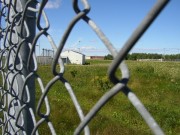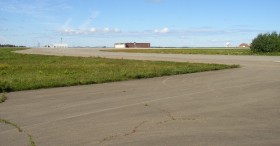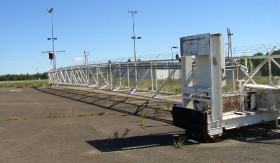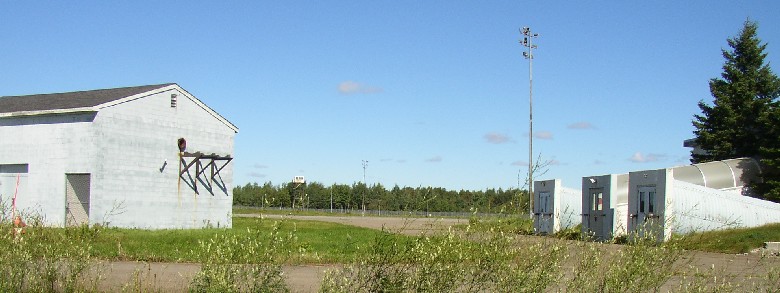Beginning in 1952, Loring Air Force Base, and, in 1953, its 42nd Bombardment Wing of B-52 bombers, created an economic supplement to potato processing in Limestone. It was renamed in 1955 for Maine’s Korean War Congressional Medal of Honor winner, Charles J. Loring, Jr.
Loring Air Force Base extended for 9,000 acres and its combined military and civilian workforce peaked at about 10,000 before its closure in the 1990’s. (See reference to Assignment in Aroostook under “Geography” in Movies.)
The overgrown and abandoned appearance, along with the cracks in the pavement of the formerly thriving base, masks the fact that, according to the local police, it still had “an active runway.” in 2003.
One of the artifacts of the installation is a pair of motorized gates (one in the photo at right above) that could be drawn together to close the runway. The far end is the “hinge,” the motorized unit is in the foreground.
 As with the former Brunswick Naval Air Station, hoping to capitalize on the infrastructure and buildings remaining, the Loring Development Authority has worked to attract businesses to an industrial park on the former base grounds.
As with the former Brunswick Naval Air Station, hoping to capitalize on the infrastructure and buildings remaining, the Loring Development Authority has worked to attract businesses to an industrial park on the former base grounds.
According to its 2018 Annual Report, the Authority (LDA) is responsible for the redevelopment of the properties of the state’s largest industrial park, Loring Commerce Centre, formerly Loring Air Force Base. In support of new job creation and new economic activity, LDA manages the 3,700-acre business/commercial and industrial park including a 1,600-acre aviation complex, along with basic utilities. It works with prospective for reuse it its facilities. Employers at Loring represent industrial, manufacturing, agriculture, forestry, energy, telecommunications, commercial, back-office, education, recreation, conservation and aviation sectors. Loring had been since 1952 and was home to The Strategic Air Command’s Bombardment Wing. Hazardous wastes including oils, fuels, spent solvents (carbon tetrachloride and barium. In the 1980s major efforts were in place to dispose of these hazards.
Additional resources
“LORING DEVELOPMENT AUTHORITY OF MAINE, 2018 ANNUAL REPORT.”
https://www.loring.org/images/Annual_Reports_LDA/2018-Annual-Report-Final.pdf (accessed May 24, 2019)
See the article on Limestone.
Lowe, James A., David P. Staley, Katherine J. Roxlau. A SYSTEMIC STUDY OF AIR COMBAT COMMAND, COLD WAR MATERIAL CULTURE, VOLUME II-16: A BASELINE INVENTORY OF COLD WAR MATERIAL CULTURE AT LORING AIR FORCE BASE. Alberquerque, NM. 1997. (accessed December 1, 2010)







